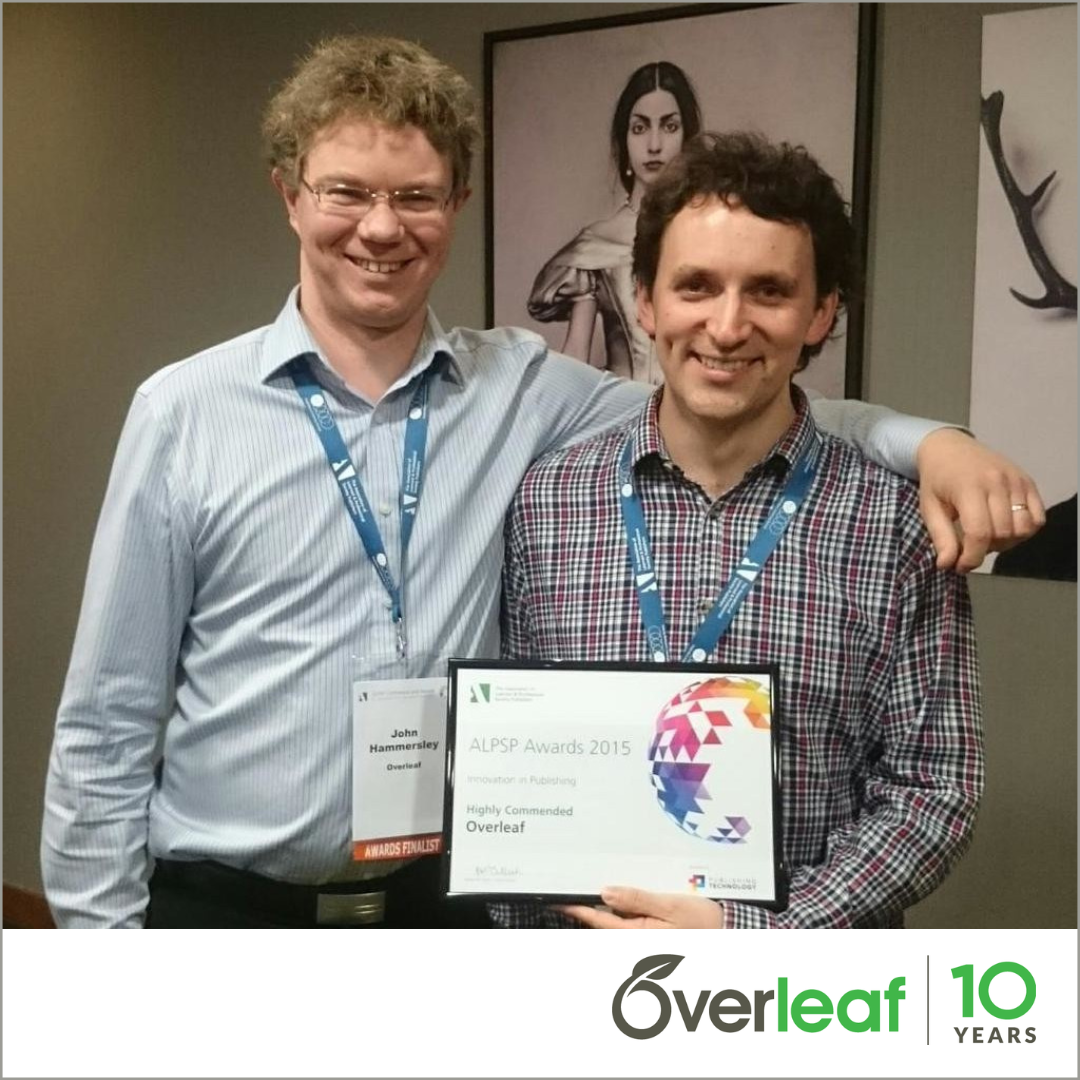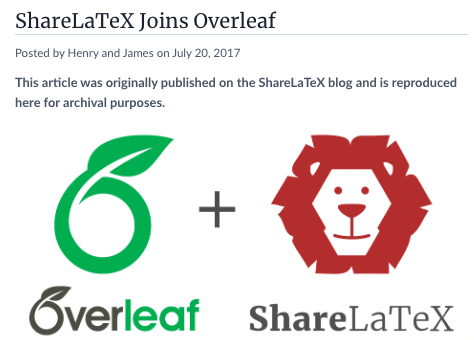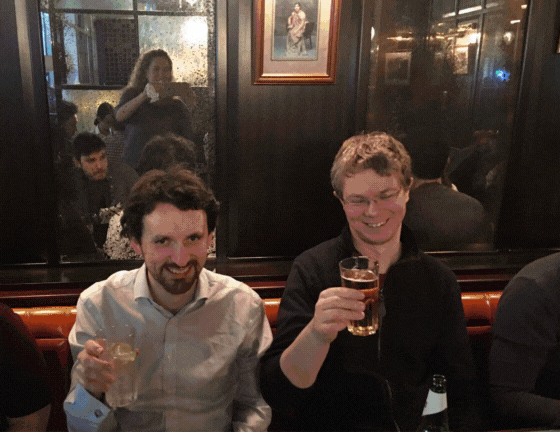Looking Back on 10 Years with Overleaf Founders John Hammersley and John Lees-Miller
April 27, 2023As part of our 10th Anniversary, we sat down with Overleaf's founders John Hammersley and John Lees-Miller to take a brief look back at its history. In a future blog post, we will take a look at Overleaf’s future with them and our new CEO Lee Shalit.

What was it like when you first met? What were your first impressions of each other?
John Lees-Miller (JLM): I think I interviewed John. He came to visit Ultra PRT, where I was working on driverless taxis. That was a long time ago. But I remember that everyone was positive about John joining. I believe he impressed us with his Mathematica skills on his first day there.
John Hammersley (JH): As John says, the first time we met would have been my interview for Ultra PRT -- I seem to recall we mainly just chatted, but I think we got on pretty well. John's very easy to talk to! I think it helped that we're both quite mathematical and logical in a way that we could usually see where the other one was coming from.
With any start up, there is always a little bit of uncertainty at the start. Was there a moment that you thought, alright, we really have something here?
JLM: In the early days, we were doing it part-time. There were a few times when things got picked up on social media. The first time it really got picked up was when a friend of mine posed a math question on Facebook, and I wrote up a little over the notebook to solve that math problem and I shared it. Nathan, who was one of our other colleagues at Ultra, thought it was pretty good and posted it on Hacker News and that was when we got our first significant amount of traffic. And we can see on the analytics that there was a big spike and then this spike mostly went away, but it didn't completely go away. That was the pattern that repeated as the site was featured on various social media.
 Slashdot post
Slashdot post
The biggest one was on Valentine's Day 2013, when it was featured on Slashdot.
With the previous social media posts it was someone we knew, but Slashdot was a total surprise. After that things really never subsided again, Slashdot kind of gave it a kick. Users kept coming back, and started referring other users.
JH: I think John has covered the early days pretty well; getting slashdotted on Valentine's Day was certainly memorable! One challenge with this question though is that, because you're so close to it all the time, you don't necessarily think that any particular thing is a big thing. So even though we had users, had early traction, we were always focused on what was coming up next! Even when we raised investment from Digital Science in 2014, in many ways that added to the pressure, rather than relieving it (as you have more resource to do more stuff, more quickly!).
If I look back now, I would probably say the point at which we joined forces with ShareLaTeX was one of the few times it really felt monumental. Not the exact day everything got signed, but once we brought the team together in London and were immediately working out how to bring the two products together; that was definitely a point at which it felt like we were really in a strong position because we had this amazing joint team working together.

Were there any Overleaf user stories or projects that stick out or made you say to yourself, “this is why we do this”?
JH: I think in the early days one of the first collaborations we heard about was Artem, Jacob and David, who worked on this evolutionary game theory approach to modeling cancer growth. They had done this weekend hackathon where they basically wrote up a paper on writeLaTeX, and submitted it to the arXiv. They were able to focus on the work of writing this preprint and get it done, whilst they were thinking about it, and whilst it was fresh and it didn't just go on the pile of things to do.
We've all got things that we start with good intentions. And then life gets in the way and then it just gets stuck on a pile and maybe never gets done. And so I think the fact that they were able to get this paper out very quickly as a preprint based on this weekend's worth of work in Overleaf felt really important to me.
Nano Ninjas
Through the years a lot of the stuff for me has been where it's unusual or unexpected uses of Overleaf. Another one that stands out is Nano Ninjas, which was a group of middle school robotics students in the US entering a robotics competition, and they used Overleaf to write up their engineering notebook notes. I was amazed and inspired by the enthusiasm of these middle school students, and it really showed in the events they took part in.
JLM: I remember one of the early stories we focused on. There was a pair of high school students, Hannah and Kat, who made a nice poster on Overleaf for their high school project. We thought that was really nice. The other thing I like to point to is a big paper written near the start of the COVID pandemic, which was one of the big reviews of mask wearing and its effectiveness. There was a big collaborative effort, and one of the tools they used was Overleaf. So, I felt like that was a good thing that we were doing to help out when everything was looking pretty dark there at the start of the pandemic.
In your 10 years have you come across any well-known users of Overleaf?
JH: Sir Tim Gowers [Fields Medalist] reached out to us via JLM’s old university email address very early on, but unfortunately the email was caught by a spam filter and not forwarded on! So we didn't reply for a month, until John happened to check his old university email directly, and I don't think we ever got a reply back. That was in our first few months, and we'd just missed out on the chance of talking with Tim Gowers!! That would have been amazing all by itself, but the fact that he was using Overleaf at the time…we would have loved to get his feedback on it. I have no idea if he still uses Overleaf, this tenth anniversary is a good time to ask him!
What advice would you give to John of 10 years ago about Overleaf?
JH: It's funny because it's the advice that someone actually gave to us about 10 years ago, which is make sure you take photos. Take photos of stuff, keep a little log, and stick them all in a folder because one day you’ll have them all there. I feel like we didn't take enough photos when it was me, John, and Tim (Employee #3), and then as new people joined. I don't think we took enough photos or videos while we were doing the day-to-day stuff. At the time you don't think things are going to change; you think things are going to be this way forever.

JLM: So, I have a policy of not giving advice. I feel like when we were getting started, so many people gave us advice. But the reality is that businesses are all very different. So, my advice to other people is usually that there's very little I can tell you that will be useful. You need to go figure it out. But I guess that doesn't preclude giving advice to myself. So that's a slightly awkward exception to that policy. At the end of the day, it's very easy to say I could have done something different, should have done something different, but you also have to keep in mind that 99% of businesses fail. So the fact that we have succeeded suggests that we actually picked out a very narrow path through a lot of obstacles and challenges.
So, I think maybe my answer would be, I would not interfere with the timeline because I suspect that any interference would probably have resulted in failure at some point along that journey.
What advice would you give to other people who are trying to launch a great new idea to the world?
JH: I learned a couple of really helpful things from our time on the Bethnal Green Ventures (BGV) programme. One is to be honest with yourself about the things you are and aren’t doing -- often this is easier if you have someone else to chat to (either a co-founder, or on a regular call with a mentor). And those chats often help you to spot if something is getting stuck on your list and not getting done, so you can try to figure out why that is. Usually we don’t do things not because they’re intrinsically hard, but because we don’t really want to do them, and spotting this early can be really helpful!
The other massively important thing we learned from BGV was to start practicing your pitch in front of people as early as possible! In this case, they set up Friday pitch practice from about halfway through the programme, and it was mandatory for every team! Even if you didn’t have any slides, you had to stand up as if it were demo day and give your pitch.
I think every team said, “Oh no, we're not ready yet!”, but it made everyone get their draft decks together sooner… and that was important because the reactions to these first drafts made us realize we needed to change them, but not how we’d expected! We thought they lacked polish/detail, but in almost every case we’d jumped too far ahead too quickly, and not set the scene properly for the audience who weren’t as close to our fields/niches as we were.
For example, we would talk about the problems people faced in scientific writing, but we hadn't even said why science and research was important, and the advancements that science has brought to the world. And whilst it sounds like you're saying really obvious things, it’s important to say them to set the scene; to give a good pitch you need to start off with things that people know and understand. BGV’s Friday pitch practice helped us learn that ahead of the real pitch!
But probably the main piece of advice I’d give is to find a co-founder, if you don’t already have one. It's a lot harder for single founders to keep things moving because they're not necessarily having the conversations that you have when there's two of you. You bounce ideas off each other, and you correct each other. Finding a really good person to start with is important.
Additional interviews
Over the years, there have been a number of interviews with John and John. You can read/watch them for more about the history of Overleaf and how they got started.
- The Overleaf Founder story
- Interview with John Hammersley at TUG 2021
- Interview with John Lees-Miller at TUG 2022
- Editage interview series with John Hammersley
- Digital Science #FoundersFriday interview
- Reddit AMA with John Hammersley
- University of Warwick interview with John Hammersley
- Developer Week profile with John Lees-Miller
- Errant Science - Reflecting on the founding, growth and success of Overleaf – Part II by John Hammersley